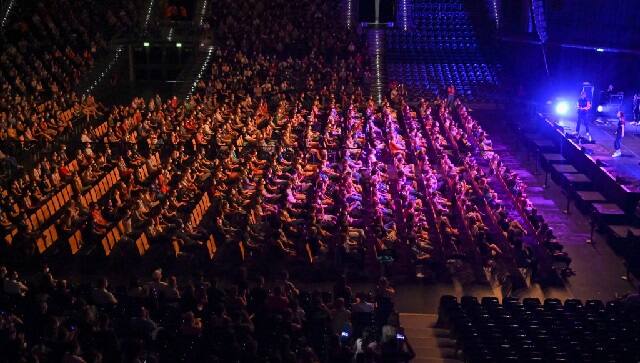Researchers in Germany may have some good news for frustrated concertgoers across the world whose activities have been constrained by the spread of the coronavirus. Analysis of an indoor concert staged by scientists in August suggests that the impact of such events on the spread of the coronavirus is “low to very low” as long as organisers ensure adequate ventilation, strict hygiene protocols, and limited capacity, according to the German researchers who conducted the study. “There is no argument for not having such a concert,” Dr Michael Gekle, part of the team at Martin Luther University Halle-Wittenberg, who conducted the study, said in an interview. “The risk of getting infected is very low.” The study was posted online and announced at a news conference on Thursday but has not yet been peer reviewed. The test event, one of the first close examinations of how a virus might be transmitted among a crowd at an indoor venue, was closely watched in the global entertainment industry, which has been hampered by lockdown restrictions in most countries since the pandemic broke out early this year. Some experts expressed skepticism about the results, saying they needed to be replicated and reviewed, and that more information was needed about how researchers used the modeling. Dr Gabriel Scally, president of epidemiology and public health at the Royal Society of Medicine, said that the findings were potentially “useful,” but that it might be difficult to replicate the controls that the researchers had implemented at many real-life events. To gauge contacts during the concert, which was held in Leipzig, volunteers were first tested for the virus and given temperature checks before entering the venue. Each person was given a hand disinfectant laced with a florescent dye and a digital location tracker, and different social distancing scenarios were simulated over 10 hours. They included breaks for attendees to go to the bathroom and to simulate buying food and drink from vendors. Participants were not distanced in one scenario, partially distanced in a checkerboard formulation in a second, and strictly distanced in a third. Researchers also used a fog machine to observe the movement of air inside the venue, and calculate the likelihood of exposure to aerosol droplets. In one model, jet nozzles on the roof above the arena’s highest rows sent fresh air through to the inner floor of the arena. In another, fresh air was sucked into the arena from the rooftop and the jet nozzles were switched off. Computer modeling found that 10 times as many people would be exposed to an infectious person’s aerosols in the second scenario compared with the first, suggesting that regular circulation of air decreased the density of any viruses in aerosols, the researchers said. Social distancing further decreased exposure to the aerosols, they said. “We knew that ventilation was important, but we didn’t expect it to be that important,” Gekle said. The simulation also found that prolonged contact — of at least several minutes — was the highest during breaks in programming, and when audience members entered the venue. But Paul Linden, a professor of fluid mechanics at the University of Cambridge, said that the computer modeling had not taken into account factors such as heat rising from an audience or indoor air turbulence, and that it was difficult to pinpoint whether it was the pattern of air flow or less ventilation in the venue that led to increased exposure to aerosols. As a general rule, he added, venues needed to bring in as much clean air as possible to lower transmission rates. [caption id=“attachment_8987991” align=“alignnone” width=“640”]  German experiment finds indoor concerts have a low risk of spreading coronavirus under safety protocols. Twitter/@Stereogum[/caption] The German team has already made a series of recommendations for safety guidelines at live events, including installing new ventilation technology that effectively and regularly exchanges air, seated food and drink breaks, making masks compulsory, and directing attendees through multiple entrances. Event organisers received the findings with cautious optimism. “Obviously if masks are going to work for larger gigs, then that’s big progress,” said Emily Eavis, co-organiser of the Glastonbury Festival, an outdoor event that drew crowds of about 135,000 people before the pandemic shut it down this summer, although she added it was much too early to tell. “We are hoping for more news by the end of the year.” And researchers in other countries are working on similar studies in the hope of finding a safe and viable way to reopen nightlife even with the pandemic still present. “We are monitoring closely and with huge interest all the similar initiatives in Europe,” Marta Pallarès, a spokeswoman for Primavera Sound, an annual festival in Spain, said in an email. Primavera Sound’s organisers are helping to conduct a study testing whether rapid coronavirus tests can be an efficient screening measure for live music events. “All these projects are tremendously important in order to secure a new future for live music,” Pallarès added. Isabella Kwai c.2020 The New York Times Company
An analysis of an indoor concert staged by German scientists in August suggests that the impact of such indoor concerts is ‘very low,’ as long as organisers ensure adequate ventilation, strict hygiene protocols, and limited capacity.
Advertisement
End of Article


)
)
)
)
)
)
)
)
)



